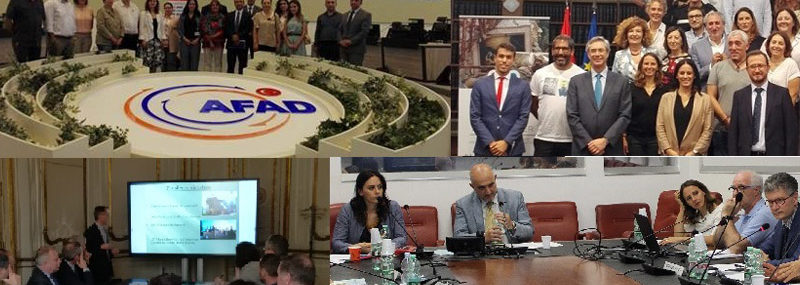From June to September 2019 the Civil Protection Authorities as members of the PROCULTHER Consortium have convened their respective national stakeholders involved in the safeguard of cultural heritage in both phases of preparedness and response, in accordance to the respective national institutional frameworks and emergency procedures.
This action is the first step for the setting up in France, Italy, Turkey and Spain of national working groups called to provide key elements to the project with the objective of developing a common European response methodology for protecting cultural heritage during emergencies. The participants were gathered in meetings in order to analyse the capacities that their Countries are capable and ready to deploy in the preparation and response phases and to specify the contribution they could offer at European and international level in this field.
In order to support this joined assessment process, the PROCULTHER Consortium drafted an outline whose scope was to allow a general understanding of the organization/status of cultural heritage policies in relation to protection and safeguard in the context of severe events in each of the partner countries; to identify and address operational aspects specifically related to existing national resources/equipment, including good practices and lessons learned; to identify and exchange good practices developed at both European and international levels for possible integration into the project’s partner countries, so as to increase the beneficiaries’ response preparedness and promote European innovative approaches in the field of civil protection at international level.
All the national meetings were carried out following a similar work agenda: after an introduction to the objectives of PROCULTHER, each group identified the opportunities and challenges offered by the initiative at national and international level, and pooled together the information provided by each participating institution on the skills, experiences, resources and best practices to protect cultural heritage in emergency at national and international level.
It is worth mentioning that the advantage offered by the organisation of these national meetings was twofold: in addition to the relevance of the issues arisen from these consultations for the purposes of the project, the Civil Protection Authorities of the Partner countries seized this opportunity to pool together this particular sector’s national expertise, highlighting its value at national level, assessing strengths and weaknesses of their national preparedness and response systems and, at best, increasing their decision makers’ awareness on the topic of cultural heritage protection and safeguard during emergencies.
The first national meeting was planned on 13 June 2019 by the French Ministry of Interior – General Directorate for Civil Security and Crisis Management (DGSCGC) at the Louvre Museum in Paris. In addition to the DGSCGC’s experts directly involved in the project, the French working group lists representatives from the French Ministry of Culture, from the Versailles site, the Condé Museum, the French Blue Shield, the Fire Brigade Corp of Paris as well some local Fire Brigade officers particularly skilled in cultural heritage sites, including one representative of the special unit in charge of the Louvre Museum security.
The Italian national meeting was held at the Civil Protection Department (DPC) premises on 21 June 2019 and gathered, in addition to the project team and DPC experts involved in the project, representatives from the Italian Ministry of Cultural Heritage and Activities, the National Fire Corps, the National Army and from the Carabinieri.
On 5 July 2019 the Ministry of Interior of Turkey – Disaster and Emergency Management Authority (AFAD) convened experts from both AFAD Headquarters in Ankara and Istanbul, from the Ministry of Culture and Tourism, the Coast Guard Command, Jandarma, National Police, Middle East Technical University and from International Council on Monuments and Sites /International Scientific Committee on Risk Preparedness (ICOMOS-ICORP).
The Ministry of Culture and Tourism of the Regional Government of Castilla y Leon, in close cooperation with the National General Directorate for Civil Protection and Emergencies decided to organise the meeting on 24 September 2019 at the National School of Civil Protection in Madrid. As a consequence of the highly decentralised institutional and regulatory framework of the Country which is also reflected in the sector of cultural heritage protection in emergencies, the meeting participants were representatives belonging to both civil protection and cultural heritage entities, coming from almost all the 17 Spanish autonomous communities, all having full powers in matters of civil protection and cultural heritage.
The output of these meetings is issued by each partner country in its own “National report on the safeguard of cultural heritage in emergency management”, in view of the next PROCULTHER milestone: the International Workshop foreseen in December 2019 in Rome. The meeting will gather representatives of the national working groups set up in the partner countries that will share their own reports for providing the project with the elements for the development of a common European response methodology for protecting cultural heritage during emergencies.







